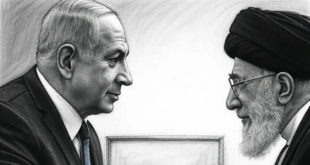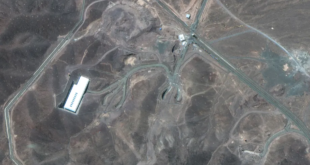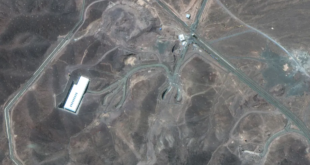Iranian leaders have repeatedly declared that Israel should be destroyed. Therefore Prime Minister Benjamin Netanyahu emphasizes that Israel will not let Iran have nuclear weapons.
The Biden administration wishes to prevent Iran from producing nuclear weapons. Israel is of the same mindset, and believes the United States should impose tough, long-term restrictions that will serve this purpose.
Israel is also concerned about Iran’s long-range missile program and generally aggressive policy in the Middle East.
However, Israel may not be able to tackle all of its concerns at once. More likely than not, Israel may have to focus on one issue, Iran’s nuclear program, at the expense of other matters.
Iranian leaders have repeatedly declared that Israel should be destroyed. Therefore Prime Minister Benjamin Netanyahu emphasizes that Israel will not let Iran have nuclear weapons. Israel must prevent Iran from producing nuclear weapons, or at least postpone this process as long as possible.
In mid-April 2021, the director of US national intelligence made the following comment: “Although Iran’s deteriorating economy and poor regional reputation present obstacles to its goals, Tehran will try a range of tools – diplomacy, expanding its nuclear program, military sales and acquisitions, and proxy and partner attacks – to advance its goals.”
Currently, the Biden administration is juggling numerous foreign affairs, such as dealing with Russia and China, and the COVID-19 pandemic. Nonetheless, the United States still needs to prevent Iran from producing nuclear weapons. In keeping with this agenda, the administration aims to revisit the 2015 international agreement known as the Joint Comprehensive Plan of Action.
Israel opposes the JCPOA, but might be willing to accept a new agreement with Iran if it includes other issues beyond mere nuclear arrangement.
For example, Israel wishes to restrain Iran’s missile project and its support of proxy organizations, such as Hezbollah, the powerful Iranian ally which has 150,000 rockets and missiles capable of reaching almost all geographic points in Israel. Proxies such as Hezbollah do pose a serious threat to Israel, yet still rank less dangerous than the possibility of an Iranian nuclear program.
On March 10, 140 members of the US Congress sent a letter to US Secretary of State Antony Blinken, urging him to include proxies and the missile program as components of any prospective agreement with Iran. This letter matches the Israeli point of view.
The Biden administration will presumably listen to Israel’s claims, as long as Israel does not demand too much. Israel should concentrate on its most crucial concern: Iran’s nuclear program. Israel can nonetheless ask to restrain Iran on other issues, as long as doing so does not compromise its most important objective: preventing Iran from producing nuclear weapons.
Iran breached the JCPOA, but may nonetheless accept some restrictions on its nuclear program that are similar to those previously laid out in the JCPOA. The Biden administration might consider this, while leaving out requests to restrain its partners or missile program. The Biden team may leave those issues for negotiation in the near future, recognizing that Iran might delay or even just reject this initiative altogether, if those requests are included.
The Biden administration can insist on talking with Iran about all of the issues contemporaneously, but doing so would be too risky. Jeopardizing the negotiation process by asking for too much is an unlikely approach for this administration.
Some of the senior officials who helped create the JCPOA six years ago now serve in top positions. The JCPOA agreement was the hard-won outcome of a focused approach on key issues, with an agreement to set aside some others. Compromise through focus on the most important matters will be a necessary feature for the upcoming agreement, as well.
Israel had close relationships with the Trump administration, but the Biden administration is a different matter. Israel is not as influential on the Biden administration, even if Biden has expressed care and concern for the Jewish state.
Israel can’t participate in the talks with Iran, but should be informed by its American patron about those negotiations. Israel can accept that without causing an escalation, let alone attacking Iran. Israel might prefer that the negotiations fail, but would also not want to take blame for it, potentially jeopardizing its delicate ties with the Biden administration.
Israel would do best to wait and see the outcome of the negotiations, while staying focused on the nuclear program.
Nonetheless, Israel hopes Iran will bring the talks with the US to a halt. This outcome may be possible, given that Iran already harbors deep suspicion toward the United States. The July elections in Iran will bring a new president and foreign affairs minister who might not trust the United States, and might be much less flexible than the current ones.
Furthermore the Iranian supreme leader, Ali Khamenei, wields a tremendous amount of influence. If he were to die due to ongoing health issues, he could be replaced by someone even more extreme and anti-American. Developments such as these might undermine talks with the United States.
ALL IN all, the Biden administration and many other governments, mostly of Arab states, share Israel’s concerns about Iran’s nuclear program, its missiles, and support of dangerous non-state proxies.
Nevertheless, Israel has to keep its eye on the ball by focusing on Iran’s nuclear program, and not on other issues, important as they might be.
Israel is in a sensitive position, since it depends on its American patron, and has somewhat weakened diplomatic relations with the US since the departure of the Trump administration.
Israel should be careful not to ask for too much, because doing so might cause it to end up with less than it could get by focusing exclusively on mitigation of Iran’s nuclear project. Israel should not disrupt the negotiations, but let Iran do that instead.
 Eurasia Press & News
Eurasia Press & News



